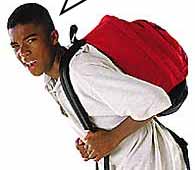

A Pain in the Backpack This section is compiled by Frank M. Painter, D.C.
Send all comments or additions to: Frankp@chiro.org




Thanks to CNN and WebMD/Healtheon for permission to reproduce this article!
February 24, 2000
By Rochelle Jones
Alexa Sloan, a slim 16-year-old, carries her world in a backpack. Slung fashionably over her shoulder, it contains several textbooks, her notebooks, day planner, lunch, posters and school projects such as the 3-D model of a cell membrane that she created for biology class.
Sloan, a sophomore at Walt Whitman High School in Bethesda, Maryland, typically carries 25 to 30 pounds in her black one-strap backpack. Too heavy, she knows, but she's reluctant to forego the convenience offered by her backpack.
"I have shoulder pains. There's a sore, pulling feeling and I worry about my spine being bent over all crooked under the weight," she says. "But I dont really have a choice. Theres not enough time between classes to go to my locker."
Although Sloan has considered -- but for now rejected -- seeking medical attention, many other young people and their worried parents are consulting physicians about muscle strains thought to be due to carrying heavy backpacks.
"We are seeing students in the fourth and fifth grades who are complaining about back aches, fatigue and (physical) stress," says Russell Windsor, M.D., an orthopedic surgeon at New York City's Hospital for Special Surgery. "They just don't have the body strength to remain erect under these very substantial loads and it puts their skeletons under substantial duress."
Survey bears out backpack/pain link
After hearing colleagues and even her own 13-year-old daughter discuss problems with backpacks, Charlotte Alexander, M.D., an orthopedic surgeon in Houston, conducted a survey of more than 100 doctors in Chicago and Wilmington, Delaware, in 1999. She found that almost 60 percent of the orthopedists reported seeing child patients with back and shoulder pain caused by heavy backpacks. Alexanders findings were presented at an October 1999 press conference held by the American Academy of Orthopedic Surgeons.
"Overloaded backpacks are contributing to increased visits to doctors' offices," Alexander says. "The extra stress placed on the spine and shoulders from the heavy loads is causing some unnecessary medical problems in children."
Long-term outlook unclear
While there is abundant evidence that backpacks can cause short-term problems, it's unclear whether they may cause permanent orthopedic conditions such as scoliosis, a curvature of the spine, or long-term damage to still-developing skeletons.
"The truth is that we don't have a clue if backpacks cause (permanent) damage," says David Skaggs, M.D., an assistant professor of orthopedic surgery at the University of Southern California School of Medicine in Los Angeles. "The scientific studies that would establish a cause-and-effect relationship simply haven't been done."
But Jerome McAndrews, D.C., a chiropractic physician and spokesman for the American Chiropractic Association, says backpacks may cause disability later in life.
"Children are carrying far too much weight in their backpacks and they are carrying them fashionably but improperly, slung over one shoulder," he says. "The (musculo-skeletal) system has limited rejuvenation possibilities. We're concerned that the damage that is inflicted now will be showing up 30 years later in even more serious back injuries."
Solutions and guidelines
According to guidelines from the American Chiropractic Association (ACA) and the American Occupational Therapy Association (AOTA), students should carry no more than 10 percent of their body weight in a backpack. (See table: "How Much Is Too Much?") The backpacks should have two adjustable and padded shoulder straps to equalize the weight and prevent shoulder, neck and back problems. Belts around the waist can also help distribute the weight properly. Although backpacks slung casually over one shoulder may be fashionable, this posture puts further stress on the back and spinal cord.
Concerned about students carrying 20, 30 even 50 pounds in backpacks, school systems across the United States -- in New Hampshire, Michigan, Florida and Nevada, to name just a few states -- have considered limiting the use of backpacks in school. Minnehaha Academy, a private school in Minneapolis, banned backpacks in its middle school in 1998 with surprisingly little reaction despite their popularity among students.
"There was less resistance than I thought there would be," Dean Erickson, the middle-school principal, says. "Kids of that age have a herd mentality. When none of them could carry a backpack, it became a non-issue."
And although some students may consider them dorky at first, another solution is to switch to backpacks on wheels. Karen Jacobs, Ed.D, professor of occupational therapy at Boston University and AOTA president, says that after discovering her two teenagers were carrying backpacks weighing 20 and 40 pounds apiece, she persuaded them to give wheels a try.
"Now all their friends are using them too," she says.
© 2000 Healtheon/WebMD. All rights reserved.

Return to BACKPACKS
Since 10-07-2000


| Home Page | Visit Our Sponsors | Become a Sponsor |
Please read our DISCLAIMER |
